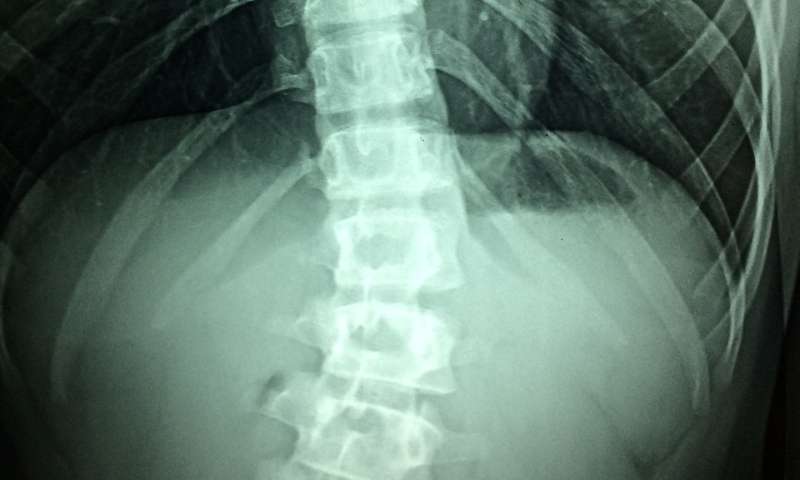This article has been reviewed according to Science X's editorial process and policies. Editors have highlighted the following attributes while ensuring the content's credibility:
fact-checked
peer-reviewed publication
trusted source
proofread
Spinal-cord injury induces an immune deficiency in patients, study finds

Patients recovering from a severe spinal-cord injury can develop an immune deficiency that puts them at risk of developing life-threatening infections, according to a new study by researchers at The Ohio State University Wexner Medical Center and collaborators in Germany, Switzerland and Canada. The study is reported in the journal Brain.
The deficiency, called spinal cord injury-induced immune deficiency syndrome, was initially identified in experimental models. The findings of this study suggest the immune deficiency also likely occurs in patients. The study of 111 patients found that monocytes, white blood cells required to fight bacterial infections, were deactivated shortly after spinal-cord injury. It also found reductions in blood levels of antibody and immunoglobulins, which are part of the body's "learned" or adaptive immunity.
Furthermore, these indicators of immune deficiency were associated with the severity to spinal-cord injury. That is, they were "neurogenic," and they add to other consequences of spinal-cord injury that also weaken the immune system such as being bed ridden, receiving anesthesia or undergoing surgery.
The researchers state the findings could lead to improvements in spinal-cord-injury care through staging a patient's susceptibility to infection. This would help to identify patients who are particularly immune suppressed and to the development of new treatments to reduce infection susceptibility early on.
"Infections and subsequent sepsis are the main cause of death after spinal-cord injury," said co-corresponding author Jan Schwab, MD, Ph.D., the William E. Hunt & Charlotte M. Curtis Chair and a professor of neurology and neurosciences at the Ohio State College of Medicine.
"Our study provides evidence for an immune deficiency that sets spinal-cord injured patients up to develop infections," said Schwab, who is also medical director of the Belford Center for Spinal Cord Injury and a Scholar of the Chronic Brain Injury Initiative at Ohio State.
The findings showed that the risk of developing an immune deficiency syndrome was greatest for patients with complete, higher-level injury (fourth thoracic vertebra or above), compared with patients having incomplete, lower-level injury (fifth thoracic vertebra or lower), and compared with a reference group of patients who had vertebral fracture that did not involve the spinal cord.
Complete spinal-cord injury results in total loss of motor and sensory function below the level of injury; with incomplete spinal-cord injury, some function remains below the level of the injury.
"Those patients with complete injuries and consequent loss of central nervous system control over immune system function displayed the highest odds for an immune deficiency," Schwab said.
The study involved 111 patients enrolled in the international prospective multi-center cohort study known as SCIentinel study. To detect the presence and severity of immune suppression in the blood of patients, the researchers measured the levels of a cell-surface molecule called mHLA-DR on monocytes.
A low number of mHLA-DR molecules is a recognized and quantifiable marker for monocyte deactivation and has been shown to predict susceptibility to sepsis in critically ill patients.
Key findings include:
- Patients with high complete injury had the highest burden of pulmonary and urinary tract infections, including recurrent infections;
- Patients with infections had mHLA-DR levels below the reference value for "immune suppression" within two weeks after injury;
- Patients with early infection (in the first or second week) had especially low mHLA-DR values in the range of "borderline immunoparalysis" already at 15 hours after injury;
- A drop in immunoglobulin (IgG and IgA) levels after spinal-cord injury suggested depressed humoral immunity as well. This was most pronounced in high completely injured patients;
- Both cellular and non-cellular immune defense mechanisms were compromised in spinal cord injury patients and associate with early onset of infections.
"Overall, our study suggests that a neurogenic immune deficiency syndrome drives infection susceptibility in spinal-cord injury patients, and it does so in a severity-dependent manner," Schwab said.
More information: Marcel A Kopp et al, The spinal cord injury-induced immune deficiency syndrome: results of the SCIentinel study, Brain (2023). DOI: 10.1093/brain/awad092


















